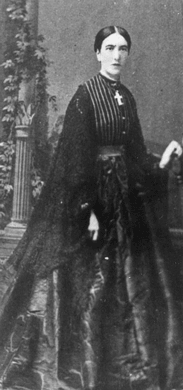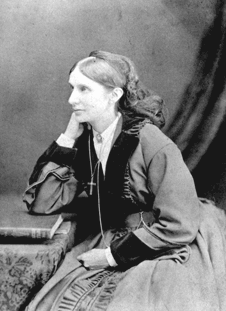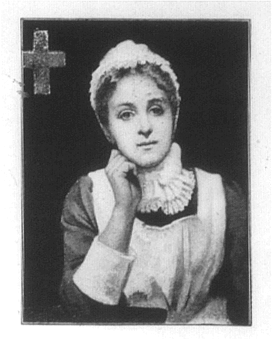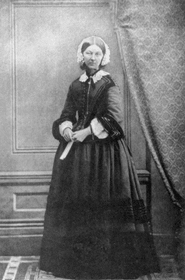Contents
Section I Introduction
1 Common Sense about Separate Spheres
Section II Exemplary Lives
2 Elizabeth Fry and the Ambiguities of Reform
3 Faith, Knowledge, and The Constitution Violated:
the Campaigns of Josephine Butler
4 A Religious Biography within a Religious Biography: Josephine Butler’s Catharine of Siena
Section III Case Studies of Reform
5 Sisters and Ladies
6 The Costs and Benefits of Caring
7 The Mysterious Demise of Sarah Gamp
Section IV Lineages of Female Action
8 Lineages of Female Action: Fry, Butler, Nightingale
9 One Step Behind? Political Paradigms
Bibliography, Index
£22.50 Paper 2000 234 x 156 mm 192pp 978-1-903152-03-4
Extract Common Sense about Separate Spheres

It became noticeable from the 1850s that ladies, or gentlewomen (as they mostly styled themselves), went to extreme lengths to describe themselves as ‘lady-authors’, ‘lady-nurses’, ‘lady superintendents’, and very often to work without salary or without the appearance of needing one. Thus Fanny Margaret Taylor, (an ex-Crimean War nurse who converted to Catholicism and founded a religious order), for many years supported her widowed mother and feckless brother by her literary work, but this was described by her biographer as being undertaken solely in order to enable her to give money to charity.[30]
Many ladies ran schools and the nursing operations of major hospitals as members of religious sisterhoods, or as volunteers, rather than as individually-paid professional teachers, matrons or managers.[31] As will be seen in Section III, Florence Nightingale in her superintendence of Crimean War nurses (1854–1856), and Jane Shaw Stewart, as first lady superintendent of female nurses for the British Army (1861–1868), took public appointments under fairly extraordinary conditions, and were correspondingly resented by male officialdom: neither took a salary, and neither reported to any individual in the official hierarchy except the Secretary of State for War himself.
All the above are telling indications that these ladies, while undertaking activities outside the home, were nevertheless supposed and supposing themselves to be in a separate sphere from the public occupied by men. They are also oblique suggestions of the extent to which, in Victorian Britain, woman was seen as the property of man. For a woman to take money or orders from a man not her own kin immediately raised the spectre of the loss of autonomy, most particularly bodily autonomy, which was synonymous with her respectability. It is worth remembering that in this period the term ‘public woman’ meant prostitute, as did, and does, the phrase ‘a woman who can be bought’. This set of ideas underlies the familial trend to remove wives and daughters from the public and economic arena as part of the process of embourgeoisement. And in the range of glosses and definitions which women themselves applied to their economic and social activities, we can see, amongst other things, how far they appropriated this discourse.[32]
from Chapter 1 Common Sense about Separate Spheres
from Lineages of Female Action

Underpinning every public act of Fry and Butler alike was a theological conviction as to the fundamental individuality and equality of each immortal soul. It is perhaps fair to state that where those who are (relatively) free attempt to act on behalf of those who are not, there must always be an assumption, or presumption, of responsibility which can be taken to imply social and moral superiority, and social and political dominance, on the part of the former. Nevertheless, we can see in the work and words of these two women the clear expression of an evangelical or salvationist egalitarianism. Beyond it we can perceive the phenomenon of a specifically female, (and ultimately, in Butler’s case, overtly feminist), identification with the souls in question; acted out, not just in public campaigns and print wars, but in dank, dirty, smelly and even frightening surroundings; these were not words or actions which came cheap. Within this particular tradition of female action there is also, and it needs to be stressed, a strong sense that government action is a necessary evil which can ensure the continuity, uniformity and accountability of desirable measures and procedures, but which is in itself, like all power, inherently corrupt. This assumption is one which transcends any simplistic notions of either progress or patriarchy…
Like Fry’s, Butler’s ultimate project was the re-Christianisation of society. Material improvements, reforms of the world’s work, were not enough. Like Fry, also, she thought all power tended to corrupt – she knew, after all, that the investigating policeman, the prosecuting magistrate, the examining medical officer, might all be clients of the condemned prostitute. But as the daughter of an Abolitionist, she was convinced that human laws could be just, and that state action could be invoked for the highest purposes; and as a participant in the growing movement for women’s emancipation, she was more conscious than Fry of those biases in the abuse of power which worked to the particular detriment of women; more convinced, also, that women’s entry into the public sphere as equal citizens alongside their brothers and husbands carried the possibility of purging the state of its impurities.

Where Butler went beyond Fry, it is plausible to see her programme as a logical development of women’s acceptance of the role in public life which Fry had proposed for them. In undertaking ‘woman’s mission’, Josephine Butler and her fellow-workers felt compelled to confront the intractable fact of the double standard of sexual morality, and its enshrinement in old and new laws. They would not have disagreed with Fry that the individual had to make her own leap to salvation, and that instruction, occupation, and mental and physical health were necessary conditions for moral and spiritual autonomy. But they now argued that these were not sufficient conditions; and that, in addition, all women needed the powers and rights of citizenship in order to establish a truly just system of law which would guarantee their right to autonomy. The state could be redeemed from itself only by its constituent elements, not by those marginal to it. Righteousness required the dissolving of the barriers between separate spheres.
from Chapter 8 Lineages of Female Action: Fry, Butler, Nightingale
Some of the images from Female Lives, Moral States
- Florence Nightingale circa 1858
- Catherine Anderson, a ‘lady volunteer&rsof the Crimean period Bodleian Library
- Josephine Butler circa 1876 Northumberland Record Office
- A respectable working nurse of 1888 Nursing Record
